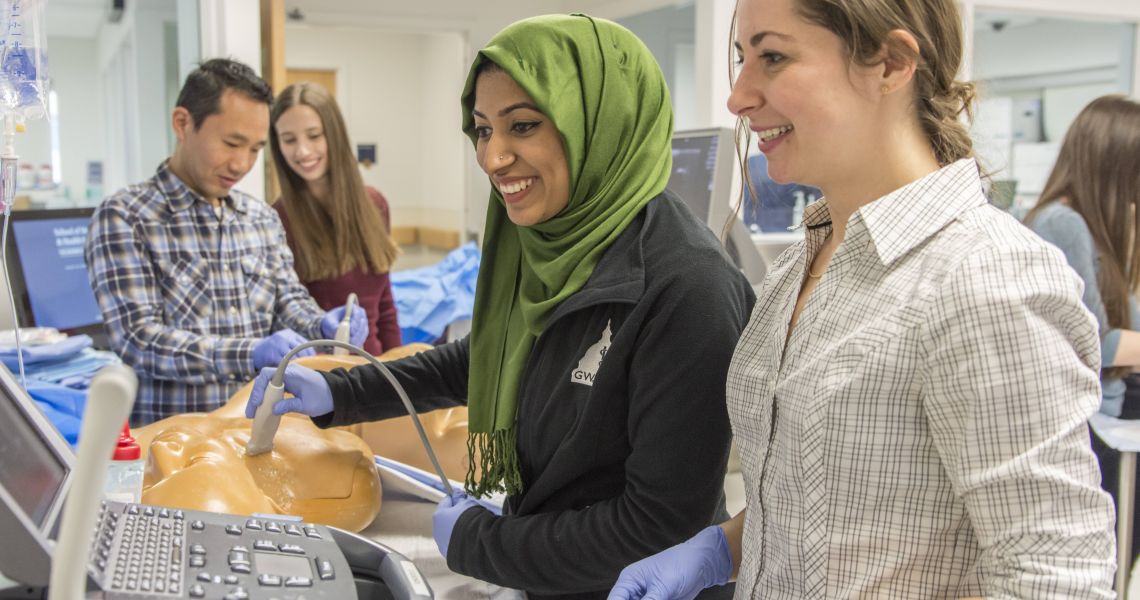
Technical Standards
Essential Functions and Technical Standards
The Health Sciences Programs at George Washington University have established Technical Standards and Essential Functions for Admission, Continuance, and Graduation for all programs, regardless of specific discipline of study. Specific to the George Washington University Physician Assistant Program, it is essential that all physician assistant students have the knowledge, skills, and professional attributes to function in a variety of clinical settings and to provide a wide spectrum of patient care. In alignment with the GW Health Sciences technical standards, but specific to the functions, skills, and practice as a PA, the GW PA Technical Standards require that every student have sufficient capacities and abilities in:
Communication:
-
Includes the ability to speak, hear, read, write, and type effectively and professionally to achieve adequate exchange of information with other healthcare professionals, patients, and their support network.
-
The student must have the ability to receive and process auditory information and speak and write clearly for all communications with patients, their families, and other healthcare professionals.
-
The student must be able to read sufficiently to comprehend complex medical literature and convey this information in easy-to-understand terms.
-
The student must be able to perceive forms of non-verbal interpersonal communication including facial expressions, body language, and affect.
Observation
-
Includes the ability to perceive, using senses and mental abilities, information presented in both educational and clinical settings. Educational information will be presented through lectures, team-based learning, laboratory sessions, interprofessional sessions, small groups, and one-on-one interactions, as well as through written and audiovisual materials.
-
The student must possess sufficient sensory (visual, auditory, tactile, and olfactory) and mental abilities to accurately perceive information provided in the educational settings. Information may be provided as written and audiovisual materials, laboratory data, diagnostic images, microscopic and histologic findings, and through conducting patient histories and performing physical examinations.
-
The student must be able to accurately observe (using visual, auditory, tactile, and/or olfactory senses) a patient’s medical condition, including patient affect, up close and at a distance, with and without medical instrumentation. This includes but is not limited to radiography, electrocardiograms, sonograms, monitors, and other graphic images.
Motor/Tactile Function
-
A student must have sufficient motor function to directly perform palpation, percussion, auscultation, and other diagnostic and therapeutic maneuvers.
-
A student must be able to reasonably execute movements required to provide general and emergency medical care to patients. These skills require coordination of fine and gross motor skills, equilibrium, and functional sensation.
-
A student must adhere to universal precaution measures and meet safety standards applicable to inpatient and outpatient settings and other clinical activities.
-
A student must have the capability to manipulate equipment and instruments for the performance of basic laboratory tests, procedures, and physical examinations.
-
A student must have the ability to move her/himself from one setting to another and physically negotiate the patient care environment in a timely fashion.
-
A student must have sufficient physical stamina to perform the rigorous course of the didactic and clinical studies. This includes long periods of sitting, standing, and moving which are required for classroom, laboratory, and clinical experience. It also includes meeting attendance requirements for classroom, laboratory, clinical experiences, and examinations as scheduled during the didactic and clinical curricula. Clinical sites may have attendance policies regarding start/stop times, daily work hours (up to 12 hours), weekly hours (up to 80 hours), and shift work (including day, evening, and overnight shifts, and weekends) that students are expected to meet.
Intellectual-Conceptual, Integrative, and Quantitative Abilities
-
A student must be able to demonstrate cognitive and problem-solving skills in an efficient and timely manner in order to meet the PA Program Competencies.
-
Problem solving is one of the critical skills demanded of physician assistants. It requires all of these intellectual abilities:
-
Reading and understanding the medical literature and the patient’s chart.
-
Learning, measuring, calculating, retrieving, prioritizing, analyzing, organizing, assimilating, integrating, and synthesizing technically detailed and complex information and applying this information appropriately.
-
Comprehending three-dimensional relationships, the spatial and functional relationships of structures, and analyzing and applying this information for problem solving and decision making.
-
Behavioral and Social Attributes
-
The student must possess emotional stability for full utilization of their intellectual abilities, exercise good judgment in decision making, and the prompt completion of all responsibility’s attendant to both didactic and clinical studies and patient care.
-
The student must be able to develop mature, sensitive, and effective relationships with patients and their family members, staff, and colleagues.
-
The student must be able to work collaboratively and effectively as a small group member as well as a health team member.
-
The student must have sufficient interpersonal skills to relate positively with people across society, including all ethnic backgrounds, socioeconomic levels, gender, gender identity, sexual orientations, disabilities, and belief systems.
-
The student must possess compassion and concern for others; interest in and motivation for service and integrity.
-
Despite the physically, mentally, and emotionally taxing workloads, the student must possess appropriate coping skills to function effectively under challenging and stressful situations.
-
The student must be able to complete several tasks within a specific time frame.
-
The student must be able to adapt to changing environments, display flexibility, and function in the face of uncertainties inherent in the clinical problems of many patients.
-
The student must behave in an ethical and moral manner that is consistent with professional values.
-
The student must be able to accept constructive criticism and appropriately respond through modification of behavior.
Completion of this program requires that each student independently demonstrate these capabilities continuously throughout enrollment. Surrogates cannot be used to accomplish the essential functions outlined above. Students may not have undue dependence on technology or trained intermediaries to meet these standards.